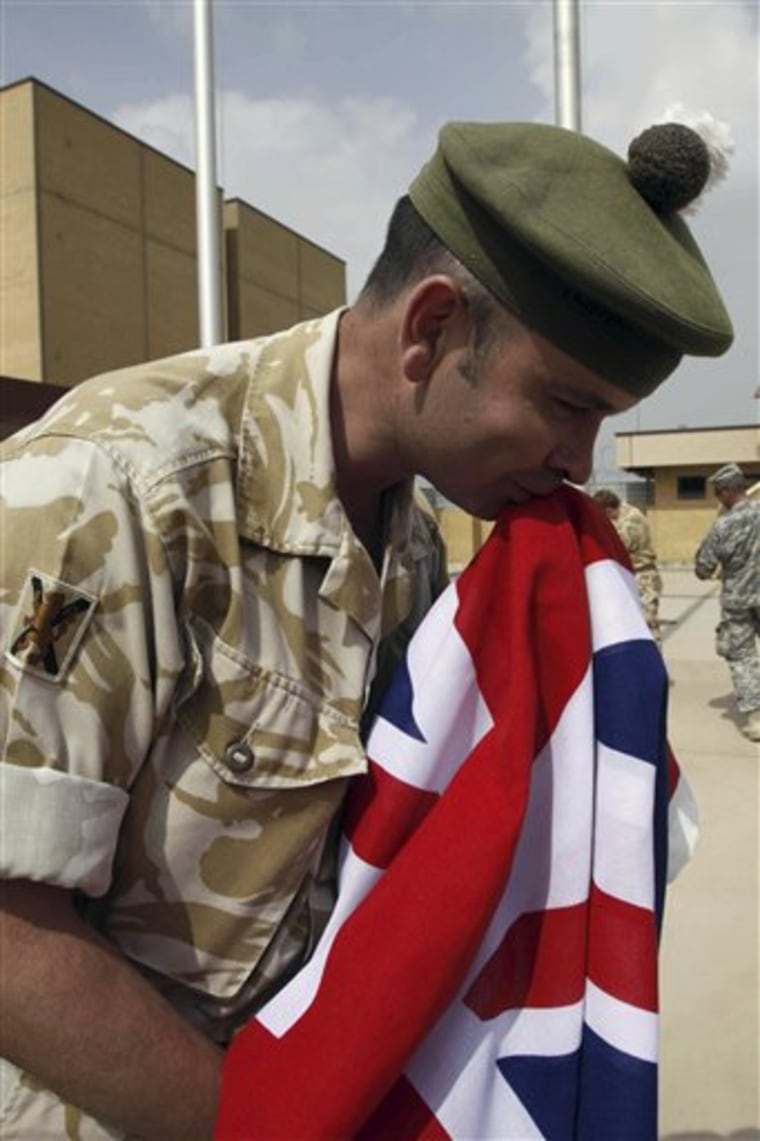The war in Iraq was truly an American-only effort Saturday after Britain and Australia, the last of the United States' international partners, pulled out.
Little attention was paid in Iraq to what effectively ended the so-called coalition of the willing, with the U.S. — as the leader of Multi-National Force, Iraq — letting the withdrawals pass without any public demonstration.
The quiet end of the coalition was a departure from its creation, which saw then-U.S. President George W. Bush court countries for support before and after the March 2003 invasion.
"We're grateful to those partners who contributed in the past and we look forward to working with them in the future," military spokesman Army Lt. Col. Mark Ballesteros told The Associated Press in an e-mail.
At its height, the coalition numbered about 300,000 soldiers from 38 countries -- 250,000 from the U.S., about 40,000 from Britain, and the rest ranging from 2,000 Australians to 70 Albanians. But most of the United States' traditional European allies, those who supported actions in Afghanistan and the previous Iraq war, sat it out.
It effectively ended this week with Friday's departure of Australian troops and the expiration of the mandate for the tiny remaining British contingent after Iraq's parliament adjourned without agreeing to allow the troops to stay to protect southern oil ports and train Iraqi troops.
U.S. maintains international presence still felt
The U.S. military, though, said the withdrawals did not mean it was going it alone in Iraq.
"We haven't lost our international partners. Rather, there are representatives from around the world here in various capacities such as NATO, military advisers, law enforcement and construction workers," said Army Col. John R. Robinson, a military spokesman at the U.S. headquarters outside Baghdad.
Australia's military commander in the Middle East, Maj. Gen. Mark Kelly, said Friday the last 12 Australian soldiers who had been embedded with U.S. units were flown out of Baghdad on Tuesday, three days ahead of the deadline. A security detachment of about 100 soldiers will remain to protect embassy personnel.
Britain withdrew its remaining 100 to 150 mostly Navy personnel to Kuwait, though it was hopeful they might return.
"We are exploring with the Iraqi Government the possibility of resuming some or all of our planned naval activity in advance of ratification," the British Defense Ministry said in a statement released Saturday.
Coalition fragile from beginning of unpopular war
The coalition had a troubled history and began to crumble within months of the U.S.-led invasion as many countries faced political and social unrest over an unpopular war.
Critics said the tiny contingents that partnered with the coalition, such as Estonia, Albania and Romania, gave the U.S. token international support for the invasion.
Mass protests were held in many countries, including Spain, which was one of the most notable withdrawals from the coalition. In 2004, a bombing attack in Madrid linked to Islamic extremists helped overturn the political establishment in Spain and the new leadership pulled out the Spanish troops.
By January 2007, the combined non-U.S. contingent had dwindled to just over 14,000. By October 2007, it stood at 20 nations and roughly 11,400 soldiers.
The U.S. military, meanwhile, has increased its focus on redefining its relationship with Iraq under a security pact that took effect Jan. 1.
American combat forces withdrew from Iraq's urban areas at the end of June and all troops are to withdraw by the end of 2011, according to the agreement. President Barack Obama has ordered the withdrawal of U.S. combat troops by Aug. 31, 2010, leaving roughly 50,000 troops to train and advise Iraqi security forces.
"Today is a normal day for our forces currently in Iraq," Robinson said, "because our business is already tied closely to our bilateral partnership with the Iraqis."
